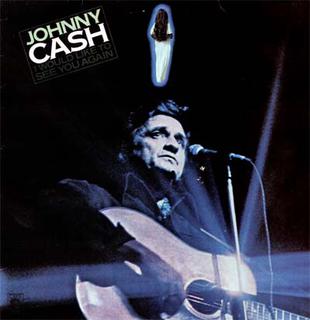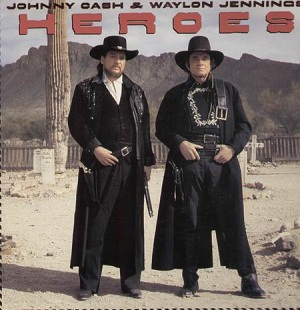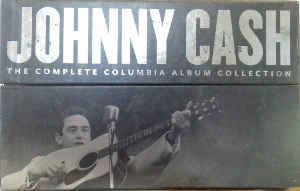Related Research Articles
Lincoln Wayne "Chips" Moman was an American record producer, guitarist, and songwriter. He is known for working in R&B, pop music and country music, operating American Sound Studios and producing hit albums like Elvis Presley's 1969 From Elvis in Memphis and the 1985 debut album for The Highwaymen. Moman won a Grammy Award for co-writing "(Hey Won't You Play) Another Somebody Done Somebody Wrong Song", a 1975 hit for B.J. Thomas.

Highwayman is the first studio album released by country supergroup The Highwaymen, comprising Kris Kristofferson, Johnny Cash, Waylon Jennings and Willie Nelson. Highwayman, released through Columbia Records in 1985, was the group's first and most successful album.

Reggie Grimes Young Jr. was an American musician who was lead guitarist in the American Sound Studio house band, The Memphis Boys, and was a leading session musician.

The Highwaymen were an American country music supergroup, composed of four of country music's biggest artists who pioneered the outlaw country subgenre: Johnny Cash, Waylon Jennings, Willie Nelson, and Kris Kristofferson. Between 1985 and 1995, the group recorded three major label albums as The Highwaymen: two on Columbia Records and one for Liberty Records. Their Columbia works produced three chart singles, including the number one "Highwayman" in 1985.

Highwayman 2 is the second studio album released by American country supergroup The Highwaymen. This album was released in 1990 on the Columbia Records label. Johnny Cash had left Columbia several years earlier, making this a "homecoming", and ultimately his final work for Columbia as the next Highwaymen album would be issued on another label.

Rainbow is the 70th album by American country singer Johnny Cash, his last for Columbia Records, released in 1985. "I'm Leaving Now", which was re-recorded 15 years later for Cash's American III: Solitary Man, was released as a single rather unsuccessfully, but the album's signature song is a cover of Kris Kristofferson's "Here Comes That Rainbow Again", which also appeared on Cash's 1995 collaboration with Kristofferson, Willie Nelson and Waylon Jennings - known as The Highwaymen - entitled The Road Goes on Forever, though it was sung solo by Kristofferson on the latter. Also included is a cover of Creedence Clearwater Revival's "Have You Ever Seen the Rain?," from Pendulum. The album also includes the song "Love Me Like You Used To," which was later recorded by fellow country singer Tanya Tucker, and became a country hit for her. Following the release of this album and a duet album with Jennings in 1986, Cash moved to Mercury Records as a result of Columbia's fading interest in his music, though he later returned to Columbia for the second Highwaymen album.

I Would Like to See You Again is an album by American country singer Johnny Cash, released on Columbia Records in 1978. The title track peaked at #12 on the singles chart, while "There Ain't No Good Chain Gang" reached #2; the album itself peaked at #23. The album features a pair of duets with Waylon Jennings, one of which was the "There Ain't No Good Chain Gang" single; it was one of Cash's first collaborations with Jennings, and the two recorded songs together throughout the 1980s, including a separate album entitled Heroes. Cash and Jennings would also work together as The Highwaymen with Willie Nelson and Kris Kristofferson.

One Piece at a Time is the 54th album by American country singer Johnny Cash, released in 1976 on Columbia Records. "One Piece at a Time," which was a #1 hit, is a humorous tale of an auto worker on the Detroit assembly line who puts together a car out of parts he swipes from the plant. "Sold Out of Flag Poles" also charted as a single, reaching #29 on the country singles charts. "Committed to Parkview", a Cash original, would be re-recorded in 1985 by Cash, Waylon Jennings, Kris Kristofferson and Willie Nelson, collectively known as The Highwaymen, on their first album, Highwayman; it is one of the few country songs sung from the perspective of a patient at a mental hospital.

Heroes is a duet studio by American country music singers Johnny Cash and Waylon Jennings, released on Columbia Records in 1986.

Repossessed is an album by Kris Kristofferson, released on Mercury Records in 1986. It was Kristofferson's first full-length solo album since 1981's To the Bone, although the singer did collaborate with other artists in the meantime, most notably on Highwayman with Johnny Cash, Waylon Jennings and Willie Nelson.

Sweet Mother Texas is an album by American country music artist Waylon Jennings, released on RCA Records in 1986. "Hanging On" was written by Tony Joe White.

Nashville Rebel is a box set by Waylon Jennings, released on RCA Nashville through Legacy Recordings in 2006. According to AllMusic's Stephen Thomas Erlewine, it is "the first comprehensive, multi-label Waylon Jennings retrospective ever assembled," comprising ninety-two songs recorded between [1958 and 1994, with selections from the majority of the singer's recording career. The first track of the box set is the Buddy Holly-produced "Jole Blon," released in 1958, while the last is "I Do Believe," a song produced by Don Was that was included on The Highwaymen's 1995 release, The Road Goes On Forever. The other material on the box set covers Jennings' career chronologically, with songs ranging from his years on RCA's roster to later compositions from his short-lived stay at Epic Records; it ignores, however, the tracks from Jennings albums released on independent labels. The majority of the singer's charting singles are included in the package, as are collaborations such as "Mamas Don't Let Your Babies Grow Up to Be Cowboys" with Willie Nelson and "Highwayman" with The Highwaymen. A notable addition is the previously unreleased "The Greatest Cowboy of Them All," a 1978 duet with Johnny Cash which was later recorded by Cash alone for A Believer Sings the Truth (1979) and The Mystery of Life (1991); two others, "It's Sure Been Fun" and "People in Dallas Got Hair," had never been released in the United States. Nashville Rebel was released on four CDs, with a 140-page booklet and liner notes by Rich Kienzle and Lenny Kaye.

"Big River" is a song written and originally recorded by Johnny Cash. Released as a single by Sun Records in 1958, it went as high as #4 on the Billboard country music charts and stayed on the charts for 14 weeks.

The Johnny Cash discography chronicles the output of American singer Johnny Cash. His lengthy career, spanning 1954 to 2003, saw the release of 91 albums and 170 singles on several record labels. Over the years, Cash also collaborated with many of the industry's most notable artists.

The Complete Columbia Album Collection is a box set by country singer Johnny Cash, released posthumously in 2012 on Columbia Records and Legacy Recordings.
"I Do Believe" is a song recorded by the American country supergroup The Highwaymen for their 1995 album The Road Goes on Forever. It was written by Waylon Jennings and produced by Don Was, with Jennings providing lead vocals on the track.
"Silver Stallion" is a song written by Lee Clayton and originally released by him on his 1978 album Border Affair.
"Born and Raised in Black and White" is a song written by Don Cook and John Barlow Jarvis, and originally recorded by The Highwaymen on their 1990 album Highwaymen 2. Mark Collie covered it for his 1991 album Born and Raised in Black & White, and Brooks & Dunn on their 1998 album If You See Her.

"American Remains" is a song written by Rivers Rutherford and originally recorded by the Highwaymen for their 1990 album Highwaymen 2. The song follows the stories of 4 historically fictional men in a similar vein to their cover of "Highwayman". Unlike in Highwayman, however, none of the characters are implied dead; their legacies are instead emphasized.
References
- 1 2 3 4 5 6 Hutchinson, Lydia (August 15, 2012). "Jimmy Webb's Story Behind The Highwayman". Performing Songwriter. Retrieved February 1, 2015.
- ↑ Hoekstra, Dave. "Glen Campbell, The Zelig of Roots Music". Chicago Sun-Times . July 24, 2005.
- ↑ Hurst, Hawkeye. - "Waylon and Johnny Walk the Straight and Narrow Together". - Orlando Sentinel . - July 21, 1985.
- 1 2 Campbell, Mary. - "High-powered Highwaymen are musical outlaws". - Associated Press. - (c/o The Augusta Chronicle ). - June 1, 1995.
- ↑ Hurst, Hawkeye. "Marty Stuart Has Come a Long Way to Just Now be Arriving". Orlando Sentinel . June 15, 1985.
- ↑ YouTube.com/Highwayman
- ↑ Compiled from data from Allmusic - allmusic.com and Billboard - billboard.com.
- ↑ "Highwayman". - Hot Country Songs. - Billboard. - billboard.com.
- ↑ MacDonald, Patrick. - "Proud Time for Pop". - The Seattle Times . - December 29, 1985.
- ↑ "Billboard's Ratings of 1985's Top Pop Music Artists". - San Francisco Chronicle . - January 1, 1986.
- ↑ "The Highwaymen Chart History (Hot Country Songs)". Billboard.
- ↑ https://www.bpi.co.uk/award/19576-6600-1
- ↑ "British single certifications – The Highwaymen – Highwayman". British Phonographic Industry . Retrieved June 1, 2024.Select singles in the Format field. Select Silver in the Certification field. Type Highwayman in the "Search BPI Awards" field and then press Enter.
- ↑ "Highwayman". - Grammy Awards. - c/o grammy.com.